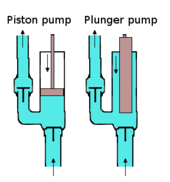Water pumps are the unsung heroes of our modern world. From the towering skyscrapers in metropolises to the humble gardens in our backyards, these workhorses ensure a steady flow of this life-sustaining resource. But with so many varieties available, choosing the right pump can feel overwhelming. This comprehensive guide will equip you with the knowledge to navigate the world of water pumps and select the perfect one for your specific needs.
Unveiling the Powerhouse: How Water Pumps Work
At their core, water pumps function by creating a pressure differential that compels water to move from an area of low pressure (source) to an area of high pressure (destination). There are two fundamental mechanisms employed by pumps:
Positive displacement pumps:
These pumps trap a certain amount of water within a chamber and then physically force it outwards. Imagine a syringe; as the plunger is pressed, water is expelled. Common examples include diaphragm pumps, piston pumps, and gear pumps.
Diaphragm pumps :
These pumps utilize a flexible diaphragm that expands and contracts to create suction and discharge water. They are well-suited for handling liquids with solids or abrasives.
Piston pumps :
Employing a reciprocating piston within a cylinder, piston pumps are known for their high pressure capabilities. They are often used in industrial applications.
Gear pumps :
These pumps utilize interlocking gears that mesh together, creating pockets that trap and move water. They are known for their smooth operation and self-priming capabilities.


Centrifugal pumps:
These pumps utilize a rotating impeller to impart kinetic energy to the water, causing it to move outward due to centrifugal force. Think of a pinwheel submerged in water; the spinning motion pushes the water outwards. Submersible pumps and jet pumps are prime examples of centrifugal pumps.
- Versatility: They can handle a wide range of flow rates and pressures.
- Efficiency: They offer high efficiency in converting mechanical energy into hydraulic energy.
- Simplicity: Their design is relatively simple, making them cost-effective and easy to maintain. Common examples of centrifugal pumps include:
Submersible pumps :
Designed to operate entirely underwater, these pumps are ideal for deep wells, cisterns, and dewatering applications.
[caption id="" align="alignnone" width="250"] wikipedia.org[/caption]
Jet pumps
Employing a venturi effect to create suction, jet pumps are well-suited for shallow wells and rainwater harvesting systems.
[caption id="" align="alignnone" width="250"] amazon.com[/caption]
Centrifugal pool pumps
Specifically designed for pool and spa circulation, these pumps ensure proper water movement and filtration.
Each type of pump offers distinct advantages and caters to specific applications. Understanding these variations is crucial for making an informed decision when choosing a water pump.
Delving into the Diverse World of Water Pumps
The realm of water pumps is vast and multifaceted. Here's a glimpse into some of the most prevalent types:
Submersible pumps
As mentioned earlier, these pumps operate entirely underwater, making them ideal for:
-
- Deep wells: Their ability to withstand submersion makes them perfect for drawing water from deep well sources.
- Cisterns: They can efficiently transfer water from cisterns used for rainwater harvesting or irrigation purposes.
- Dewatering applications: In flooded basements or construction sites, submersible pumps can effectively remove unwanted water.
Shallow well pumps
Designed for wells with a depth of less than 25 feet, shallow well pumps are suitable for:
-
- Domestic water supply: They can provide a reliable source of water for homes with shallow wells.
- Irrigation systems: They can effectively draw water for watering gardens or lawns.
Jet pumps
Utilizing a venturi effect to create suction, jet pumps are well-suited for:
-
- Shallow wells: Similar to shallow well pumps, they can efficiently draw water from shallow well sources.
- Rainwater harvesting systems: By creating suction, they can effectively transfer rainwater collected in barrels or tanks.
Centrifugal pumps
Discussed previously for their versatility, centrifugal pumps find use in numerous applications, including:
-
- Pool and spa circulation: They ensure proper water movement and filtration in pools and spas, keeping your backyard oasis sparkling clean and enjoyable throughout the season.
- Irrigation systems: They can provide the necessary pressure for efficient sprinkler systems, ensuring your lawn and gardens receive adequate hydration to thrive.
- Pressure boosting: In situations with low water pressure, booster pumps can increase the pressure throughout a building, guaranteeing a strong flow from faucets and showers.
- Sump pumps: Specific types of centrifugal pumps, sump pumps remove unwanted water from basement sump pits, safeguarding your home from flooding.
This list merely scratches the surface of the available pump varieties. When making your selection, consider factors like the depth of your water source, desired flow rate, pressure requirements, and intended usage.
Selecting the Champion: Choosing the Right Pump
Here's a roadmap to guide you in selecting the optimal water pump for your needs:
- Identify your application: What do you intend to use the pump for? Watering your garden, supplying water to your home, or draining a flooded basement?
- Evaluate your water source: Is it a deep well, a shallow well, a surface source like a pond, or will you be using rainwater?
- Determine your flow rate needs: How much water do you require per minute or hour?
- Assess your pressure requirements: How much pressure is necessary to achieve your desired outcome?
- Consider your power source: Do you have access to grid electricity, or would a solar-powered pump be a better fit?
- Factor in your budget: Water pumps range in price depending on their type, capacity, and features.
Pro Tip: Consulting a qualified pump specialist at a reputable store can be immensely helpful, especially for complex applications. They can assess your specific needs and recommend the most suitable pump for the task.
Optimizing Performance: Installation and Maintenance Tips
Once you've chosen your champion pump, follow these pointers for a smooth installation and extended lifespan:
- Installation: Always adhere to the manufacturer's instructions for proper installation. This may involve considerations like sizing pipes appropriately, installing check valves to prevent backflow, and securing the pump in place to prevent vibrations.
- Maintenance: Regular maintenance is vital for ensuring optimal pump performance and longevity. Refer to the owner's manual for specific maintenance schedules, which may include cleaning filters, lubricating moving parts, and checking for leaks.
Conclusion: Keeping the Water Flowing
By understanding the various types of water pumps, their functionalities, and the factors to consider when choosing one, you're well-equipped to navigate the world of these.


No comments yet